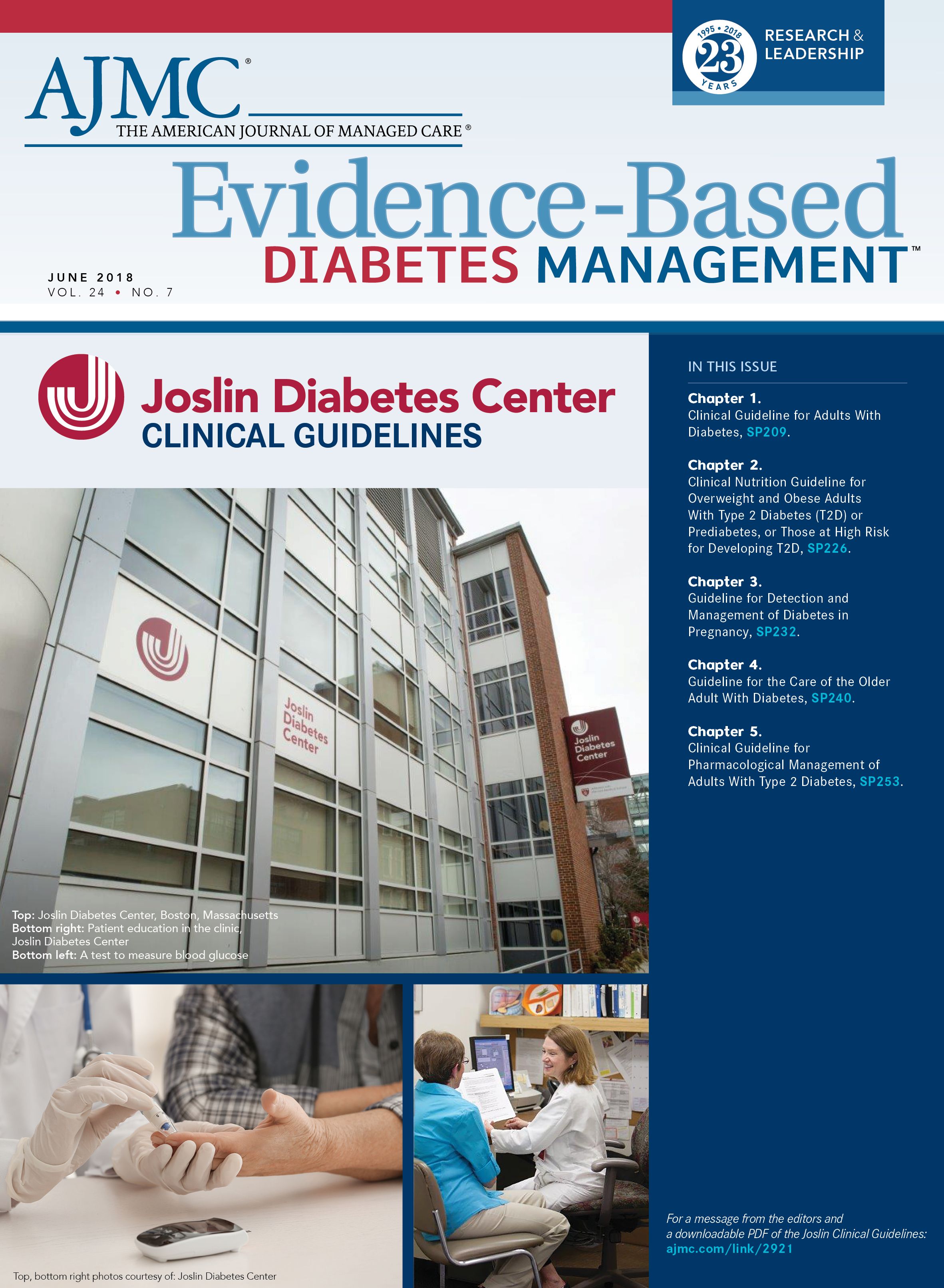- Center on Health Equity & Access
- Clinical
- Health Care Cost
- Health Care Delivery
- Insurance
- Policy
- Technology
- Value-Based Care
From the Editors: Bringing the Joslin Clinical Guidelines to the Diabetes Care Community
Om P. Ganda, MD, serves as chair of the Joslin Clinical Oversight Committee, and Robert A. Gabbay, MD, PhD, FACP, is senior vice president and chief medical officer of Joslin Diabetes Center.
With this issue of Evidence-Based Diabetes Management™, we present publication of the first installment of the Joslin Clinical Guidelines, which are the principles that influence our clinical behavior every day at Joslin Diabetes Center and our affiliates and partners around the world. Although some sections of the guidelines have been in use for years, our collaboration with The American Journal of Managed Care® represents our first cohesive effort to update and publish the guidelines in a searchable format, one more easily shared with audiences beyond Joslin. It is our hope that publication of the guidelines, in partnership with the leading peer-reviewed journal dedicated to research and leadership in health outcomes, will bring the Joslin Clinical Guidelines into wider use. Through use of these guidelines, patients around the world can benefit from the knowledge, research, and practices developed over more than a century of focus on the care of people with diabetes.
As explained in the overview, the Joslin Clinical Guidelines are developed by the Clinical Oversight Committee at Joslin Diabetes Center, for which we serve as chair and ex-officio members, respectively. Our Clinical Oversight Committee includes physicians, nurses, certified diabetes educators, and behavioral health specialists who are experts in treating individuals with diabetes of all ages. More importantly, our committee members are leaders in developing strategies to help those living with diabetes self-manage their disease. Our process invites the participation of faculty with special expertise who are not on the Clinical Oversight Committee; these experts serve on working groups for individual guidelines. We thank all who have participated in the development of the guidelines over many years for your contributions.
The guidelines are evidence based, and the overview explains our use of a modified form of the GRADE system (Grading of Recommendations, Assessment, Development and Evaluation). For this installment, we present the following: the Clinical Guideline for Adults With Diabetes; the Clinical Nutrition Guideline for Overweight and Obese Adults With Type 2 Diabetes (T2D) or Prediabetes, or Those at High Risk for Developing T2D; the Guideline for Detection and Management of Diabetes in Pregnancy; the Guideline for the Care of the Older Adult With Diabetes; and the Clinical Guideline for Pharmacological Management of Adults With Type 2 Diabetes. With this installment, we have covered the major issues that most physicians, registered dietitians, certified diabetes educators, nurse practitioners, physician assistants, and pharmacists will encounter in clinical practice. The Clinical Guideline for Pharmacological Management of Adults With Type 2 Diabetes has been revised to reflect recent scientific advances and regulatory developments that offer more choices than ever for diabetes management. We repeat the position that Joslin Diabetes Center announced earlier this year, when we concurred with the American Diabetes Association, the American Association of Clinical Endocrinologists, the Endocrine Society, and the American Association of Diabetes Educators that those with diabetes should aim for glycated hemoglobin of 7% or lower, not between 7% and 8%.
Is diabetes self-management challenging? Yes. But as these guidelines reflect, and as we see at the Joslin Diabetes Center every day, self-management can succeed through empowering our patients and engaging them alongside appropriate pharmacotherapy. We hope this publication serves as both a resource and an inspiration to providers who are struggling with what to do next for their patients. We invite your feedback and look forward to sharing more of the best practices developed at Joslin—so that individuals with diabetes can live the best lives possible.
Sincerely,
Om P. Ganda, MD
Medical Director of the Lipid Clinic
Chair, Clinical Oversight Committee
Joslin Diabetes Center
Robert A. Gabbay, MD, PhD, FACP
Senior Vice President,
Chief Medical Officer
Joslin Diabetes Center
Note: For a PDF of the Clinical Guidelines in this issue, download the PDF at the end of this letter. Individual PDFs of each guideline are included at the end of each chapter.

Exploring Pharmaceutical Innovations, Trust, and Access With CVS Health's CMO
July 11th 2024On this episode of Managed Care Cast, we're talking with the chief medical officer of CVS Health about recent pharmaceutical innovations, patient-provider relationships, and strategies to reduce drug costs.
Listen
Empowering Children and Parents Through Technology: Opportunities, Challenges, and Future Directions
January 15th 2026Digital health platforms improve pediatric care by offering customized, interactive tools for children and parents. They enhance education, support, and engagement while tackling challenges related to access, usability, and privacy.
Read More

